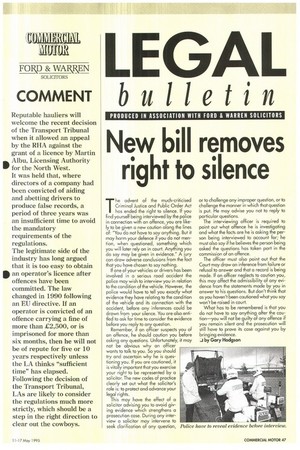LEGAL
Page 49

If you've noticed an error in this article please click here to report it so we can fix it.
bulletin
PRODUCED IN ASSOCIATION WITH FORD & WARREN SOLICITORS
New bill right to removes silence
The advent of the much-criticised Criminal Justice and Public Order Act has ended the right to silence. If you find yourself being interviewed by the police in connection with an offence, you are likely to be given a new caution along the lines of: 'You do not have to say anything. But it may harm your defence if you do not mention, when questioned, something which you will later rely on in court. Anything you do say may be given in evidence." A jury can draw adverse conclusions from the fact that you have chosen to say nothing.
If one of your vehicles or drivers has been involved in a serious road accident the police may wish to interview you in relation to the condition of the vehicle. However, the police would have to tell you exactly what evidence they have relating to the condition of the vehicle and its connection with the accident, before any inferences could be drawn from your silence. You are also entitled to ask for time to consider the evidence before you reply to any question. Remember, if an officer suspects you of an offence, he should caution you 'before asking any questions. Unfortunately, it may not be obvious why an officer wants to talk to you. So you should try and ascertain why he is ques tioning you. If you are cautioned, it is vitally important that you exercise
your right to be represented by a solicitor. The new codes of practice clearly set out what the solicitor's role is: to protect and advance your legal rights.
This may have the effect of a solicitor advising you to avoid giv ing evidence which strengthens a prosecution case. During any interview a solicitor may intervene to seek clarification of any question, or to challenge any improper question, or to challenge the manner in which that question is put. He may advise you not to reply to particular questions. The interviewing officer is required to point out what offence he is investigating and what the facts are he is asking the person being interviewed to account for; he must also say if he believes the person being asked the questions has taken part in the commission of an offence.
The officer must also point out that the Court may draw an inference from failure or refusal to answer and that a record is being made. If an officer neglects to caution you, this may affect the admissibility of any evidence from the statements made IT you in answer to his questions. But don't t ink that as you haven't been cautioned what you say won't be raised in court.
What has to be remembered is that you do not have to say anything after the caution—you will not be guilty of any offence if you remain silent and the prosecution will still have to prove its case against you by bringing evidence.
by Gary Hodgson




































































































